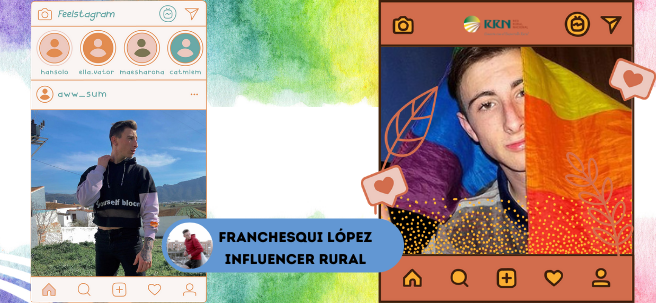
01 de July de 2021
Dinamización rural
Francisco Javier. AKA "Franchesqui_López." AKA "La marika de pueblo." Behind these two stage names, at 22 years of age, lies one of the country's most prominent and influential rural activists.
- Rural influencer Franchesqui López – also known as “the village faggot” – speaks to the National Rural Network about LGBTI rights in rural areas.
With nearly 9,000 followers on Instagram and a whopping 175,000 followers on TikTok , Franchesqui uses virtual platforms to talk about LGBTI rights in the villages, as well as to showcase his (sporadic) work in the countryside and his rural way of life.
With naturalness and self-confidence, and taking advantage of the rigor of some specialists when creating certain videos (for example, to talk about sexually transmitted diseases), Franchesqui uses the window of social networks to share not only educational content, but also his experiences as a resident of Almendral de Zafarraya , a town of 300 inhabitants in Granada.
And, although he is a university student of social education at the University of Almería, the pandemic has brought him back to the family home to study remotely.
National Rural Network: What is it like to return to the Franchesqui village?
Franchesqui: Well, returning to the village has brought me back to help my parents in the fields . My mother is a housewife, and my father works both in the hospitality industry, since he runs a bar in the village, and in the countryside, because we have a large field whose produce we sell to Mercamálaga and local producers. I'm not ashamed to work the land. The truth is, I learn a lot, even though it takes up all my free time. The countryside teaches me to manage my time and emotions well. And, as my mother says, "it gives me a job for the summer."
RRN: Would this way of life be your medium and long-term life project?
F: My future plans include working as a social worker and combining that with studies and work in audiovisual communication. I love photography and video editing. Audiovisual work is my passion, but social work is my calling. And I aspire to be able to combine both.
RRN: When and why did you decide to jump into the world of social media?
F: I decided to come out to them in my teens when I was in the closet. YouTube brought me closer to realities I wasn't aware of and that showed me a world where I fit in. I stopped considering myself sick. The truth is that through social media, I began to discover the LGBTI movement and learn the concept of "self-love." They also saved me from a breakup I had when I was 16. It was a toxic relationship, not only because we were in the closet, but because there was a sense of control and superiority due to being older than me. And it was making videos for YouTube that allowed me to grieve while also beginning the process of coming out.
RRN: Have you experienced bullying at school because of your sexual orientation?
F: Yes. I had a bad time and even had suicidal thoughts. But once I got over it, I started loving myself and not caring what people thought. What I did care about was my family. So once I was empowered as a person, I faced that process too.
RRN: How was the family's reaction?
F: "I'll kill you" were my father's first words. He refused to accept it. We went three months without speaking. But over time, and with a lot of patience on my part in deconstructing his prejudices, we started talking. My father now realizes that I don't need his approval or his validation to develop my life. And that has required a lot of family re-education on my part. And openness on his. My mother has played a fundamental role in the reconciliation, but it has been hard work for both of us.
RRN: What do you claim behind the identity of “village faggot”?
F: “Marika de pueblo” reclaims the feminine, because misogyny encompasses everything, to the point of criminalizing the term “faggot” or anything that might be feminine. My social media content speaks about diversity, feminism, and racism. The LGBTI movement goes far beyond being gay or homosexual. It's about deconstructing stigmas for all people in general. Being an activist means taking an active and political stand against labels and criminalizations based on issues of gender identity or sexual orientation. Activism must serve as a key to changing consciousness . And for me, “educational humor” is essential: my TikTok videos use humor to break down prejudices.
RRN: Do you think that people with a homosexual orientation experience it differently in a town than in the city?
F: Gay life in the villages is difficult. Your life belongs to others because everyone knows each other, and this kind of "shared life" magnifies everything: both the love you receive and the despised. In the village, "rural sexile" (leaving your place of origin because of your sexual orientation) still exists because many people choose not to express themselves and stay in the closet.
RRN: What is your perception of the progress made in equality and respect between people?
F: LGBTI rights have been achieved today at the legal and judicial levels. And that's in Spain. At the social level, they haven't yet. That's the current struggle: the battle against social stigmatization .









